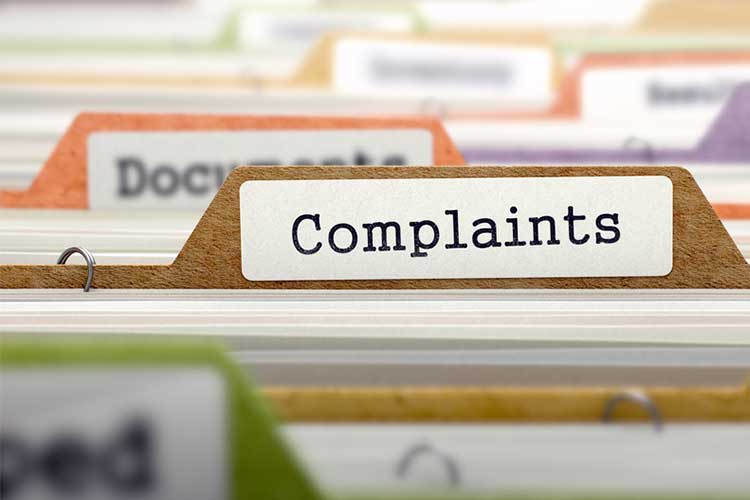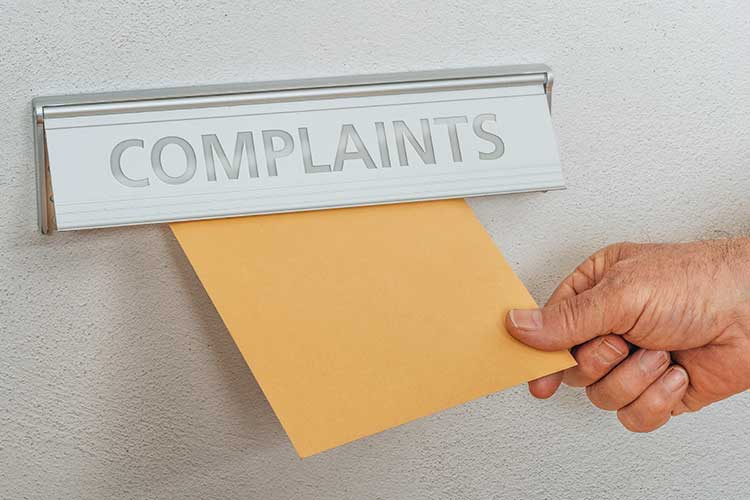All people living with disabilities have the right to make complaints about the supports they are receiving from the National Disability Insurance Scheme (NDIS) (NDIS 2019).
Acknowledging and responding to complaints positively is an essential component of safe and high-quality service delivery (NDIS 2015).
Despite this, handling complaints can often be complicated and hard to navigate (Suter & Ausmed 2024).
What is a Complaint?
A complaint, in simple terms, is ‘an expression of dissatisfaction’ (NDIS 2015).
Complaints might relate to:
- The supports or services being provided
- The provider itself
- Staff members
- Products
- The way in which a previous complaint was handled.
(NDIS 2019)
The person making the complaint, whether an NDIS participant, family member, friend, carer, advocate, guardian, worker or volunteer, will expect a resolution or response to their grievance (NDIS 2015).
Complaints may be made in response to minor, or in some cases, more serious issues. However, all complaints, irrespective of size, should be taken seriously so that the complainant feels their input is being valued (NDIS 2015).

What is an Effective Complaint Handling System?
An effective complaint handling system should:
- Ensure issues are addressed adequately and in a timely manner
- Strengthen the relationship between the service provider, participant and participant’s family and representatives
- Enable continuous service improvement.
(ACQSC 2021)
Effectively managing and resolving complaints has many benefits, for example:
- It demonstrates that the provider has a commitment to improving services
- The complainant feels acknowledged, valued and empowered
- The relationship between the provider and the participant may improve
- The provider is able to identify and fix problems related to service delivery
- The provider is able to better meet participants’ needs
- The provider is able to use complaints to drive improvements to services, communication, and policies and procedures.
(NDIS 2015, 2019)
Feedback and Complaints Management in the NDIS Practice Standards
Feedback and complaints management is a requirement of the NDIS Practice Standards under Core Module 2: Provider Governance and Operational Management.
This Practice Standard aims to ensure that all NDIS participants are informed about and able to access the provider’s complaints management and resolution system. Furthermore, the provider should welcome, acknowledge, respect and properly manage all feedback and complaints (NDIS 2021).
NDIS providers must meet the following quality indicators:
- Providers must maintain a complaints management and resolution system that is relevant and proportionate to the scope and complexity of the supports being delivered and the size and scale of the organisation. This system must comply with the National Disability Insurance Scheme (Complaints Management and Resolution) Rules 2018 and follow the principles of procedural fairness and natural justice.
- Participants must be informed about how to provide feedback or make complaints, external avenues for making complaints, and their right to engage advocates. There must also be a supportive environment for any participant who provides feedback or complains.
- Providers must seek to continuously improve their feedback and complaints management through:
- Regular reviews of policies and procedures
- Seeking feedback from participants about the accessibility of the complaints management system
- Incorporating feedback.
- All workers should be appropriately trained in complaints handling.
(NDIS 2021)
Managing Complaints
Principles of Complaints Management
The NDIS Commission lists six principles of complaints management:
- Complaints management is respectful of and responsive to participants’ preferences, needs and values.
- Complaints management is outcome-focused; the factors contributing to complaints are identified and prevented in an effort to prevent issues from reoccurring.
- Complaints management is clear, simple, consistent and accessible.
- NDIS providers are responsible for managing complaints appropriately. All parties involved understand their obligations and are accountable for their decisions or actions.
- The complaints management process facilitates the continuous improvement of services.
- Any actions that are taken in response to a complaint are proportionate to the complaint.
(NDIS 2019)
Making Complaints Accessible

Anyone who wishes to complain should be able to do so easily. Accessibility is a key component of an effective complaint management system (ACQSC 2021).
Information about making complaints should be available in several forms to ensure accessibility for those living with disabilities, including NDIS participants (NDIS 2015).
Accessibility can be achieved through:
- Providing information sheets to participants and their representatives explaining how to complain
- Publicising your organisation’s complaints policy and contact details
- Making websites accessible to complainants using screen readers
- Making information available in Braille, large print or audio formats for complainants living with vision impairments
- Asking complainants if they have any access or communication requirements
- Assisting complainants who have reading or writing difficulties
- Accepting complaints from representatives on behalf of those living with intellectual impairments
- Providing text telephone (TTY) services for complainants living with hearing impairments
- Providing access to advocates and language services
- Actively seeking feedback
- Encouraging participants and their representatives to raise concerns
- Gathering feedback in a variety of formal and informal ways (e.g. suggestion boxes, forms, conferences).
(ACQSC 2021; NDIS 2015)
Complaints Management Systems
NDIS providers must implement a complaints management and resolution system.
This is a requirement under the National Disability Insurance Scheme (Complaints Management and Resolution) Rules 2018 (NDIS 2024).
According to the NDIS, this complaints management system should:
- Allow any person to make a complaint, even anonymously
- Ensure that NDIS participants are informed about how to make complaints to the provider or NDIS Commission
- Provide support and assistance for contacting the NDIS Commission, if required
- Provide simple, accessible documentation detailing how to make a complaint
- Address complaints directly and at the point of service unless further investigation is required
- Use a clearly documented process for receiving and resolving complaints that is easy, accessible and transparent
- Acknowledge, assess and resolve complaints in a fair, efficient and timely way
- Ensure that appropriate actions are taken in response to complaints
- Designate a complaints manager who is responsible for coordinating the handling of complaints
- Provide appropriate support and assistance (e.g. from staff, advocacy services or family members) to any person who has made a complaint or wishes to do so
- Ensure that no person who makes a complaint is adversely affected by making a complaint.
(NDIS 2015)
Note: When managing complaints, always consider privacy legislation and respect participants’ privacy and confidentiality (NDIS 2015).
The Complaints Management Process
A complaints management process should generally follow these steps:
1. Acknowledging the Complaint
Complaints should be acknowledged in a timely manner. It is important to:
- Outline the complaint process to the complainant
- Encourage the complainant (and their representative if applicable) to participate in the resolution process
- Provide the complainant with the name and contact details of relevant personnel
- Assure the complainant that you will maintain confidentiality
- Provide the complainant with an estimated duration for the complaint resolution process and inform them about when they will next be contacted.
(ACQSC 2021)
In some cases, a written acknowledgement may be appropriate. If the complaint was received via mail and can be addressed quickly, it may even be possible to provide the complainant with an acknowledgement and resolution simultaneously (ACQSC 2021).
2. Assessing the Complaint
This step involves:
- Clarifying the specific issue that has been raised by the complainant
- Assessing the level of risk to the wellbeing, safety and health of those involved in the complaint
- Determining whether any specific aspects of the complaint need to be prioritised
- Communicating with the complainant to determine how they would prefer the issue to be resolved (e.g. apology, change in services, raising awareness of the issue)
- Determining whether any legal representatives need to be consulted.
(ACQSC 2021)
Depending on the specific problem and the complainant’s preferences, some issues may be easier to resolve than others. However, if the complainant’s desired outcome is unachievable, you will need to explain why this is the case and offer them alternatives (ACQSC 2021).
Part of the assessment process is planning, i.e. determining how exactly the complaint will be managed. A plan might identify:
- The issues that need to be addressed
- The complainant’s desired resolution and whether it is achievable
- Any information that needs to be gathered and legal representatives that need to be consulted
- An estimate of the time it will take to resolve the issue
- Any special considerations e.g. sensitive or confidential information.
(ACQSC 2021)
The participant, complainant and staff should be included in the planning process to ensure that a mutually agreed resolution is determined (ACQSC 2021).
Some complaints may also require investigation, i.e. the gathering of relevant information to help inform an appropriate resolution. Remember to uphold the principles of fair investigation: impartiality, confidentiality, transparency and timeliness (ACQSC 2021).
3. Responding to the Complaint

Once an appropriate resolution has been determined, the next step is to formally communicate this to the complainant and other parties involved. Depending on the situation, this could be through a conversation or written explanation (ACQSC 2021).
At this stage, you may consider offering an apology to the complainant. Apologising demonstrates empathy and may contribute to a more positive outcome, even if you are not completely at fault. An apology may also lead to an improved relationship between the service provider and the complainant (ACQSC 2021).
4. Following Up the Complaint
Ask the complainant for feedback on how their complaint was managed. If the complainant is unsatisfied, you may consider internal reviews, mediation or other options (ACQSC 2021).
5. Considering the Complaint
When finalising a complaint, always remember that the issue could occur again in the future. It may be beneficial to review policies and procedures or initiate systemic improvements (ACQSC 2021).
Recording Complaints
Record all complaints, detailing at a minimum:
- Information about the complaint
- Actions that have been taken in response to the complaint
- The outcomes of any actions that have been taken.
(NDIS 2015)
All complaint records must be kept for seven years from the date they were documented (NDIS 2015).
Communication is Key
Generally speaking, handling complaints well is underpinned by engaging with complainants about their concerns and working to understand the resolutions they are seeking.
Communication issues account for the majority of complaints, and in many cases, complainants are simply looking for an explanation or an apology (HCC 2020).
Another common motivation behind complaints is to prevent the same thing from happening to others. This is why it is crucial to acknowledge complaints promptly and let people know what is being done to prevent them from happening again (HCC 2020).
When engaging with complainants, you should:
- Welcome the complaint, thank the complainant for raising the issue and show eagerness to resolve the problem.
- Be positive, professional, polite and empathetic.
- Offer information that may help the complainant gain a better understanding.
- Take notes to better clarify the situation and demonstrate that you are taking the complaint seriously.
- Always respect the complainant’s privacy and dignity.
- Be honest and avoid making promises that can not be upheld.
- Know how to apologise properly. Keep in mind that under Victorian legislation, ‘sorry’ is not an admission of guilt. By saying sorry, you are simply acknowledging that the complainant is upset and that their grievance/issue matters to you.
- Outline clearly to the complainant what is being done to address the complaint in order to be proactive and assure them that their feedback is being taken seriously.
- Practice active listening.
- Be aware of your body language and use nonverbal cues such as expressions, movement, gestures and eye contact.
- Recognise and respond to signs of stress from complainants.
- Validate the complainant’s concerns and commit to resolving the issue in a timely manner.
- Be patient; avoid rushing or interrupting the complainant.
- Escalate the complaint if required.
(ACQSC 2021; Victorian Ombudsman 2017)
Conclusion
Remember that complaints are to be expected in all healthcare settings. It is not whether you receive complaints, but how you handle them that reflects your practice.
Test Your Knowledge
Question 1 of 3
Why is it important for NDIS providers to welcome and properly manage complaints?
Topics
References
- Aged Care Quality and Safety Commission 2021, Better Practice Guide to Complaint Handling in Aged Care Services, Australian Government, viewed 26 August 2024, https://www.agedcarequality.gov.au/sites/default/files/media/better_practice_guide_to_complaints_handling_in_aged_care_services_v4.pdf
- Health Complaints Commissioner 2020, Complaint Handling Standards, Victoria State Government, viewed 26 August 2024, https://hcc.vic.gov.au/providers/complaint-handling-standards
- NDIS Quality and Safeguards Commission 2024, Managing Complaints, Australian Government, viewed 26 August 2024, https://www.ndiscommission.gov.au/providers/complaints-management
- NDIS Quality and Safeguards Commission 2019, Complaints Management and Resolution Guidance, Australian Government, viewed 26 August 2024, https://www.ndiscommission.gov.au/document/581
- NDIS Quality and Safeguards Commission 2015, Effective Complaint Handling Guidelines for NDIS Providers, Australian Government, viewed 26 August 2024, https://www.ndiscommission.gov.au/sites/default/files/2022-02/complainthandlingguidelinesforproviders_0.pdf
- NDIS Quality and Safeguards Commission 2021, NDIS Practice Standards: NDIS Practice Standards and Quality Indicators, Australian Government, viewed 26 August 2024, https://www.ndiscommission.gov.au/sites/default/files/2022-02/ndis-practice-standards-and-quality-indicatorsfinal1_1.pdf
- Suter, C & Ausmed 2024, ‘How to Deal with Complaints in Healthcare’, Ausmed, 16 April, viewed 26 August 2024, https://www.ausmed.com.au/cpd/articles/complaints-in-healthcare
- Victorian Ombudsman 2017, Apologies, Victoria State Government, viewed 26 August 2024, https://www.ombudsman.vic.gov.au/learn-from-us/practice-guides/apologies-guide/

